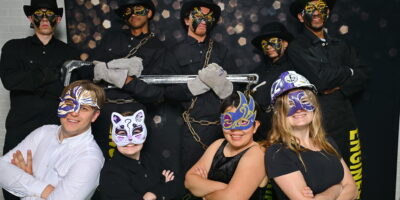I’m not a fan of clichés, but seriously, where did the term go? It seems like just yesterday I was starting my first on-stream term as the President. It’s been a great term folks, with a lot of ups and some downs. But it’s not over yet! We still have a handful of events coming up. Potluck, Coffee House, EOT, EngPlay, and more!
Why am I writing this? Who am I writing this for? I don’t know. Maybe I’m writing it for someone who’s thinking about running for President next term, and this might help them with their decision. Maybe I’m writing this for former Presidents, so when they read this they can have a good chuckle. Maybe at some point in the future, a President will read this and think “Yea, I feel the same way too”. Or maybe I’m writing this for myself; maybe I’m writing this down so I can really see what I learned and hopefully become better.
So, here goes.
Things Will Almost Never Go As Planned
You can plan a project or an event as much as you want. You can even plan it to the minute. Something will still go wrong. It’s probably not even your fault. You probably couldn’t have seen it coming, and even if you did, there’s not much that you could’ve done.
So why am I telling you this? Am I trying to be a downer, or a “realist”? No. I want you to be aware of this fact, and give you some advice on how you can minimize the chances and the consequences of a plan going off track.
First of all, if you have a timeline for your plan, thrown in an extra 20%-30% of time. Humans tend to underestimate the time needed to complete a task, and overestimate their productivity. We all do it, and we know that. You didn’t pull that all-nighter because you planned it.
Secondly, make your plan flexible. There is something as too much planning. Mechies, think of it as over-constraining a part. Other disciplines, I’m sorry: you’re going to have to come up with your own analogy. The best plans are the ones that can adapt to different circumstances.
Everyone Will Give You Their Two Cents
The government is getting rid of the penny, but that doesn’t mean that people will stop giving you theirs. It seems that everyone has “advice” for you, everyone is telling you what to do, and everyone is telling you how to do your job.
I hate to break it to you, but this is your job. Your role as the President of the Engineering Society is to represent the Society. This means that you have to listen to the concerns of its members (i.e. Engineering students) and try to fix their concerns, or at least direct them to the right direction to go about fixing their problems. If people are not coming up to you and telling you how to fix the Society, then you’re doing it wrong.
What can you do about it? Well for one you can accept the fact that that’s a major part of the President’s role and enjoy it. I actually liked it when concerned students come and talk with me, and it was one of the reasons that I ran for President last spring.
You also need to learn when to pursue an issue. Is it worth it? Does it affect a lot students or just a select group? How will it affect other students? Can you actually fix it? These are some questions that you should be asking yourself, your fellow exec, and possibly the student(s) who brought it up.
And for the love of God, don’t disregard the first years. No, they don’t have experience. No, they don’t know what has been brought up in the past, or how things work. But that’s the exact reason you need to be listening to them. Having a different perspective can be exactly what the Society needs. Plus you don’t want to give out the wrong message and drive them away.
It is Very Hard to Separate the Business and the Personal
Let me clarify this. As President, or an exec member for that matter, you deal with and talk to students all the time. A lot of these students are people you know, and some of them are even your friends. This is where it gets tricky; your personal relationship with students will affect your relationship with them as a President, and vice versa, and you have to be aware of it.
It’s weird but PD7 (Conflict Resolution) got it right: focus on the problem, not the person. Once you do that, you will understand the problem better. You will also realize that what seemed to be a huge conflict was mainly due to the personal relationship you have with the person, rather than the problem itself. Similarly, don’t let EngSoc arguments affect your personal relationships. End the meetings on a good note. Remind them, and yourself, that you’re doing this to better the Society.
I can go on some more, but this article is getting way too long for Andrew to edit, and I fear that he will start chasing me with a stapler and a copy of the IW.
See you all next term.
Yasser.




Leave a Reply